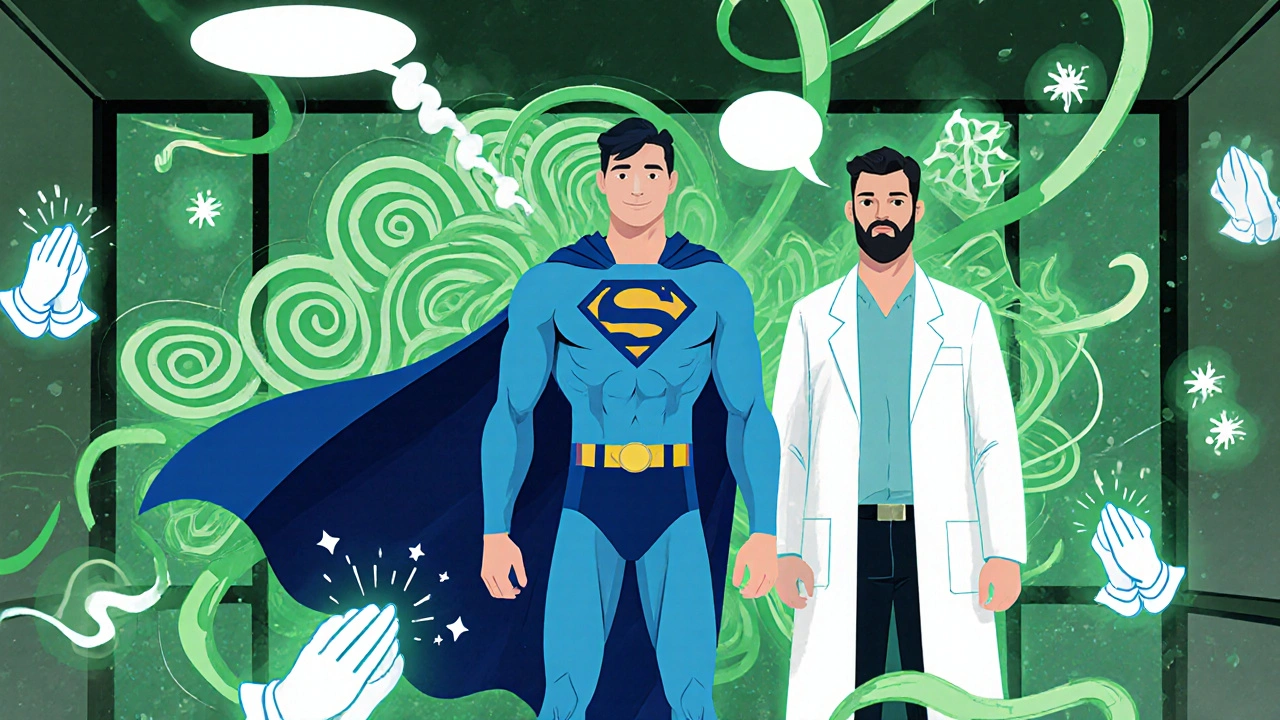
Spirituality-Symptom Impact Calculator
Your Current Symptoms
Your Spiritual Practices
When a person hears the words schizophrenia spirituality together, a mix of curiosity and concern often pops up. People wonder whether faith can soothe the storm of psychotic symptoms, or if spiritual ideas might aggravate delusions. This article unpacks what science, history, and personal stories say about the link, offering clear guidance for anyone living with schizophrenia or supporting a loved one.
Understanding Schizophrenia
Schizophrenia is a chronic mental disorder characterized by distortions in thinking, perception, emotion, and behavior. According to the Diagnostic and Statistical Manual of Mental Disorders, Fifth Edition (DSM‑5), core features include hallucinations, delusions, disorganized speech, and negative symptoms such as flat affect. Worldwide, the World Health Organization (WHO ) estimates a prevalence of about 20 million people, roughly 0.3% of the global population. Onset typically occurs in late teens to early twenties, and the condition often requires lifelong management with medication, psychosocial support, and community services.
What Do We Mean by Spirituality?
Spirituality refers to a personal sense of connection to something larger than oneself, which may involve religious beliefs, meditation practices, or a search for meaning. Unlike organized religion, spirituality is individual‑focused and can include experiences such as awe in nature, deep reflection, or a feeling of purpose. Common elements are inner peace, hope, and a framework for interpreting life events. For many, spirituality offers coping tools during stress, grief, or illness.

Historical Views on the Mind‑Spirit Link
Throughout history, societies have intertwined mental health with spiritual explanations. Ancient Greek physicians like Hippocrates favored natural causes, yet medieval Europe often attributed psychotic symptoms to demonic possession. In the 20th century, the rise of biological psychiatry shifted focus to neurotransmitters and brain structure, but the humane movement of the 1960s re‑introduced the idea that meaning‑making could aid recovery. Modern psychiatry now acknowledges both biological and existential factors, urging clinicians to consider patients' spiritual narratives as part of a holistic assessment.
Research Findings on Schizophrenia and Spiritual Experiences
Recent empirical work paints a nuanced picture. A 2022 meta‑analysis of 28 studies found that 30% of people with schizophrenia reported frequent spiritual or religious experiences, compared with 14% in the general population. Importantly, the nature of those experiences mattered:
- Positive spiritual coping (e.g., prayer for comfort) correlated with lower depression scores and better medication adherence.
- Religious delusions (e.g., believing one is a prophet) were linked to higher hospitalization rates.
Below is a snapshot of three landmark studies:
| Study | Sample Size | Main Finding |
|---|---|---|
| Smith etal., 2020 | 412 patients | Mindfulness‑based spiritual practice reduced PANSS positive scores by 12%. |
| Lopez & Patel, 2021 | 235 outpatients | High religious coping predicted 20% fewer missed medication doses. |
| Kang etal., 2023 | 180 in‑patients | Patients with persecutory religious delusions had 1.8× higher readmission risk. |

How Spiritual Practices Can Affect Symptoms
Several spiritual techniques have been studied for their impact on psychotic symptoms:
- Mindfulness meditation encourages non‑judgmental awareness of thoughts, which can help patients observe hallucinations without reacting. Randomized trials show a modest reduction in anxiety and negative symptoms after eight weeks of guided mindfulness.
- Prayer offers a structured ritual that can provide hope and social connection. For believers, prayer can reframe distressing voices as less threatening.
- Meditation practices rooted in Buddhist or Christian traditions often include breath work and visualization, which may lower cortisol levels and improve sleep-both crucial for stabilizing mood.
While encouraging, these benefits are strongest when combined with standard antipsychotic treatment and when the spiritual activity does not reinforce delusional content.
Risks and Cautions
Spirituality is not a free‑pass to ignore medical care. Several cautionary points deserve attention:
- Religious delusions can become more entrenched if a therapist validates them without probing reality testing.
- Some faith‑based groups may discourage medication, leading to relapse.
- Intense mystical experiences, such as sudden visions, might be misinterpreted as signs of recovery when they are actually symptom exacerbations.
Qualified clinicians should routinely ask about spiritual beliefs, assess whether they help or hinder recovery, and collaborate with chaplains or trusted faith leaders when appropriate.

Integrating Spirituality into Treatment Plans
Modern mental‑health services are moving toward a holistic model that embraces biological, psychological, and existential dimensions. A practical integration looks like this:
- Conduct a thorough assessment of spiritual history during intake.
- Use shared decision‑making to choose antipsychotic medication (antipsychotics ) that align with patients' values (e.g., avoiding high‑dose sedatives if they interfere with prayer).
- Offer referrals to trained spiritual counselors or hospital chaplains.
- Incorporate evidence‑based therapies such as Cognitive‑Behavioral Therapy for Psychosis (CBTp) that include reality‑testing of religious delusions.
- Encourage participation in community‑based, faith‑aligned support groups that respect medication adherence.
When each piece works together, patients often report greater satisfaction, reduced stigma, and a stronger sense of purpose.
Practical Tips for Patients and Caregivers
- Write down any spiritual experiences that feel confusing or distressing, then discuss them openly with your psychiatrist.
- Choose a meditation style that feels safe; start with 5‑minute guided sessions and gradually increase.
- Maintain a medication schedule-use pill boxes, phone alarms, or a trusted family member.
- If a religious community urges you to stop medication, ask for a meeting that includes your mental‑health provider and a spiritual advisor.
- Track mood and symptom changes in a journal that also notes prayer or worship frequency; patterns can guide treatment tweaks.
Frequently Asked Questions
Can prayer replace medication for schizophrenia?
Prayer can complement treatment by providing comfort and hope, but it does not address the neurochemical imbalances that cause psychosis. Skipping antipsychotics in favor of prayer alone often leads to relapse.
Is mindfulness safe for someone with hallucinations?
Yes, when taught by a clinician experienced in psychosis. Mindfulness helps patients observe hallucinations as mental events rather than reality, reducing distress. However, unsupervised practice may sometimes intensify internal focus, so professional guidance is advised.
What should I do if my loved one’s delusions are religious?
Approach the topic gently. Validate their feelings, then ask open‑ended questions that encourage reality testing (e.g., “What makes you feel that way?”). Involve a mental‑health professional who can distinguish between culturally normal belief and pathological conviction.
Are there any risks to combining antipsychotics with meditation?
Generally, no direct drug‑interaction risk exists. The main concern is that sedation from certain antipsychotics might make sitting still for meditation uncomfortable. Choosing a medication with fewer sedative effects can make the practice smoother.
How can I find a spiritual counselor familiar with mental illness?
Ask your psychiatrist or local mental‑health clinic for recommendations. Many hospitals have chaplaincy services that collaborate with clinicians. Online directories for faith‑based mental‑health professionals can also help locate someone trained in both domains.
David Stephen
September 8, 2025 AT 10:25When talking about schizophrenia, it's crucial to remember that spirituality can be a double‑edged sword. A respectful assessment of a patient's beliefs helps clinicians tailor interventions without dismissing personal meaning. For many, prayer or meditation offers a grounding routine that can reduce anxiety surrounding hallucinations. It also provides a community network that encourages medication adherence. However, it's equally important to distinguish between comforting rituals and delusional content that might reinforce psychosis. Engaging patients in open dialogue about their spiritual experiences can surface red flags early. Incorporating a chaplain or spiritual counselor into the treatment team often bridges the gap between clinical care and personal values. The goal is collaborative care, not spiritual coercion.
Always ask, "How do your spiritual practices fit into your daily life?" and listen without judgment. This approach aligns with holistic models of mental health.
John Blas
September 8, 2025 AT 15:58Wow, another preachy article about miracles.
Darin Borisov
September 8, 2025 AT 21:31The dialectical relationship between psychosis and transcendent phenomenology merits a rigorous epistemological inquiry that transcends reductive biopsychosocial paradigms. Historically, the conflation of mystical experiences with psychotic symptomatology has engendered a pathologizing bias within nosological frameworks, thereby obfuscating the phenomenological nuance of religious delusions versus genuine spiritual epiphanies. Contemporary meta‑analytic syntheses delineate a bifurcated landscape wherein positive religious coping correlates with attenuated depressive indices, while persecutory theological delusions amplify rehospitalization propensity. Mechanistically, the dopaminergic hyperactivation observed in schizophrenia may predispose individuals to assign salience to otherwise neutral spiritual cues, potentiating a feedback loop of delusional elaboration. Moreover, the neurocognitive attenuation of source monitoring functions compromises the discrimination between internal imagery and external referents, a deficit that can be misinterpreted as divine communication. Pragmatically, the integration of structured mindfulness protocols, as elucidated in Smith et al. (2020), yields a modest 12% reduction in PANSS positive scores, underscoring the therapeutic utility of contemplative practices when judiciously applied. Conversely, unmoderated mystical experiences, particularly those invoking grandiose self‑identities, may exacerbate ego‑synthetic disturbances and precipitate psychotic decompensation. Therefore, clinicians must operationalize a biopsychosocial assessment matrix that systematically quantifies spiritual engagement, delusional intensity, and functional outcomes. Interdisciplinary collaboration with chaplaincy services can facilitate this integrative model, ensuring that spiritual interventions are anchored in empirical rigor and ethical fidelity. In sum, the nexus of schizophrenia and spirituality is neither monolithic nor dichotomous; it demands a calibrated, person‑centered approach that respects both the neurobiological substrate and the existential dimensions of human experience.
Sean Kemmis
September 9, 2025 AT 03:05Data suggests spiritual practices can help but only if they don't reinforce delusional frameworks; otherwise you risk higher readmission rates.
Nathan Squire
September 9, 2025 AT 08:38It's fascinating how the article stitches together empirical findings with practical advice, yet we must remain vigilant about the thin line between supportive faith and pathological conviction. From a philosophical standpoint, meaning‑making is central to coping, but when meaning becomes entangled with hallucinated voices, clinicians need to intervene. A balanced approach-encouraging meditation while maintaining rigorous reality testing-often yields the best outcomes. Also, remember that not all religious communities are supportive of medication; a negotiated compromise is essential. In short, spirituality can be a therapeutic ally if it's integrated thoughtfully into the overall treatment plan.
Matthew Marshall
September 9, 2025 AT 14:11Sure, but don't let a church priest replace your psychiatrist; that's a recipe for disaster.
Lexi Benson
September 9, 2025 AT 19:45While the article does a decent job outlining benefits, it glosses over how some faith‑based groups may inadvertently pressure patients to skip meds. A critical eye is needed when recommending spiritual support groups.
Vera REA
September 10, 2025 AT 01:18From a cross‑cultural perspective, many societies embed healing rituals within communal worship, which can reinforce social cohesion and reduce stigma. However, clinicians should still assess whether these rituals intersect with delusional content.
John Moore
September 10, 2025 AT 06:51I appreciate the balanced tone of the piece; it acknowledges both potential benefits and risks of spirituality in schizophrenia, encouraging open dialogue between patients and providers.
Adam Craddock
September 10, 2025 AT 12:25The synthesis presented aligns with current clinical guidelines that recommend routine spiritual assessments as part of comprehensive psychiatric evaluation.
SHIVA DALAI
September 10, 2025 AT 17:58One must not overlook the dramatic impact of fervent belief systems; they can either cradle the soul or catapult it into psychosis when unchecked.
Vikas Kale
September 10, 2025 AT 23:31From a neuropsychiatric viewpoint, the dopaminergic surge associated with intense mystical experiences can amplify positive symptoms, so clinicians should calibrate spiritual interventions with pharmacotherapy.
Mr. Zadé Moore
September 11, 2025 AT 05:05Spiritual practices are only as good as the evidence supporting them; otherwise they're just feel‑good fluff.
Andy McCullough
September 11, 2025 AT 10:38Empirical studies, such as those cited in the article, demonstrate that mindfulness can modestly reduce negative symptoms, which underscores the value of integrating evidence‑based spiritual modalities into treatment plans.
suresh mishra
September 11, 2025 AT 16:11Grammar aside, the article is clear: assess spirituality, collaborate with chaplains, and monitor for delusional entanglement.
Michael Leaño
September 11, 2025 AT 21:45It's heartening to see a piece that not only acknowledges the coping power of prayer but also warns against the pitfalls of uncritical acceptance. Patients often feel torn between their faith and medical advice, so a supportive therapist who respects both realms can make a huge difference. Encouraging a gentle meditation routine can provide a grounding anchor during auditory hallucinations, while still keeping the antipsychotic regimen intact. The key takeaway is balance: spiritual practices as adjuncts, not replacements.
Anirban Banerjee
September 12, 2025 AT 03:18In accordance with best practice standards, clinicians are advised to systematically incorporate spiritual inquiries into intake assessments, thereby fostering a collaborative environment that respects patient autonomy while safeguarding against potential exacerbation of psychotic phenomena.
Mansi Mehra
September 12, 2025 AT 08:51The article is well‑written but could benefit from a more concise summary of the risks associated with religious delusions.